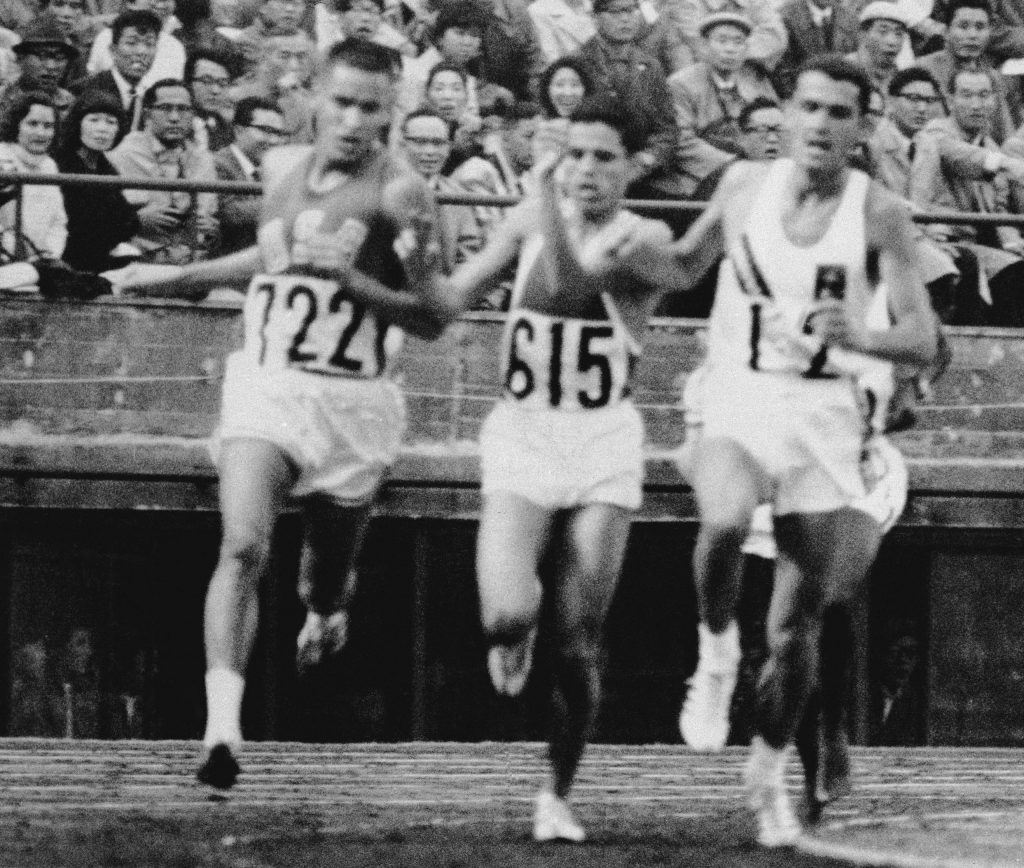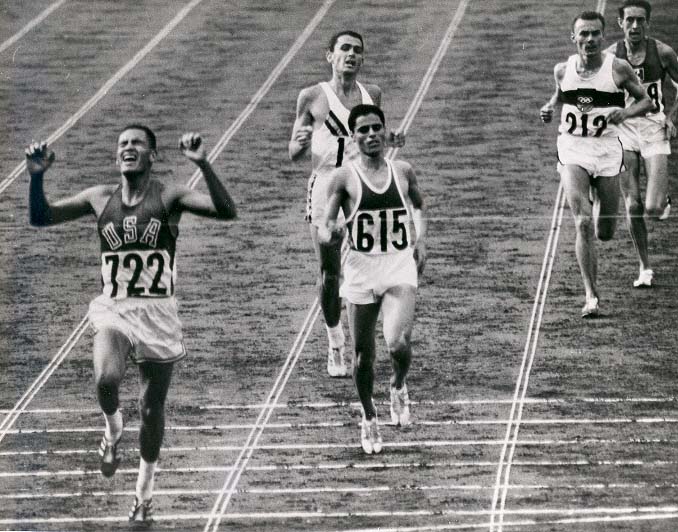Note: This is a story from the upcoming book, ‘Rings to Cubicles‘ that features inspiring Olympians and their amazing feats of courage.
The year was 1964. Heavy rainfall has soaked the tracks of the Tokyo Olympic Games. All eyes were on Ron Clarke, the crowd and media favourite to win the 10,000 meters race. All around the world, people expected the fight to be fought closely between Clarke and Tunisian Mohammad Gammoudi.
Native American Billy Mills, on the other hand, went largely unnoticed pre-game. This was expected for no American has ever won the Olympic gold in the 10,000 meters race. He was nothing but an underdog, for all the world cared. But in that final fighting moment in the 1964 Tokyo Olympics, there was Mills — head to head with world-class elite runners Clarke and Gammoudi.
As if all that wasn’t surprising and exciting enough for spectators around the globe, something remarkable happened — something so iconic that it would eventually make for a story passed through generations. On to the final laps, it still wasn’t clear to whom the race would belong. Until Mohammad Gammoudi took matters into his own hands (instead of his feet). He put each of his hands on Clarke and Mills’ shoulders and shoved them aside to create space for him to steam ahead and gain a substantial lead.

Bearing down on the finish in the Olympic 10,000-meter race, the medal winners fight for running space in Tokyo, Oct. 14, 1964. They had to shift lanes to detour stragglers a lap or more behind. Here Mohammed Gamoudi of Tunisia pushes his way between Billy Mills of the U.S., left, and Ron Clarke of Australia. Mills won in one of the biggest upsets in Olympic history. Clarke, former champion, was third with Gamoudi second. (AP Photo)
Clarke budged momentarily but regained momentum almost instantly. Mills, on the other hand, fell slightly behind that everybody thought he was out of the race for sure. Like a scene straight out of an inspirational film, Mills shot forward, seeming more determined than ever, to overtake Clarke and Mohammad in a manner that made everyone’s jaws drop.
There was the man, in all his glory, winning the race against every odd in the book, surely making a lot of people lose good money for betting on the favourites. Not only did Mills become the first-ever American to break the tape on the 10K Olympic run, he actually broke the world record. He clocked in a finish time of 28:24:4, almost a full minute faster than his best run before the race.

Truly, the come-from-behind win was a stunner to the spectators, but those who have known Mills for the longest time couldn’t have been so surprised that he had that much fight and heart in him. After all, Gammoudi pushing him aside wasn’t the first setback he had gone through in life. See, the struggle is all he had known:
Mills, whose original Lakota Sioux name is Makata Taka (which translates to love your country), was born in 1938 at the Pine Ridge Reservation in South Dakota. The environment he grew up in wasn’t very pretty: poverty, crime, alcoholism, and depression were some of the things Mills was exposed to at such a young age. Furthermore, he was only nine years old when his mother died. It was too much for the young boy’s heart to take in, so his father took him aside and told him how he would someday transform his broken wings to become “wings of an eagle.”
Four years later, his father died, too.
But his lessons never left the young boy, crestfallen and alone as he was. In interviews, Mills would always say that he only fully understood what his dad’s words meant when he recognized his athletic talent as a teenager.
“The Olympics would be the day I fly with the wings of an eagle,” he would remember thinking.
As a young boy, Mills saw the Olympics as nothing more than a way to be with his parents again. This thinking was embedded in his very psyche after he read a passage about the Games: “Olympians are chosen by the Gods.”
Mills was fighting for something he truly cared for that rainy day in 1964: he thought that if he became an Olympian, then he would be able to see his mother again.
Aside from having to deal with tragic losses very early in life, Mills had to go through the culture of racism as a teen when it was much, much worse than it is right now. The civil rights movement was just beginning to gain traction in America then, so the society wasn’t very kind to Native Americans like Mills, even though he had won many awards and recognitions for his athletic talent at the University of Kansas. One time, a photographer even asked him to “step out of the All-American photo.”
Despite all these, Mills continued to shine. At the University of Kansas, he earned the NCAA All-American three-peat, as well as a consistent place finisher at the NCAA Cross-Country Championships three times. Not to mention he also claimed the Big-8 Cross-Country title twice.
He fought and fought hard to achieve his goals. Things got so bad for him that he once contemplated ending his life, but was able to decide against it. He fought it with the same determination (and probably the saving grace of his father and guardian). He was even drafted as a Marine for a few years after that. But eventually, he found his best reason to live on, inspired and fueled by his biggest goal as written multiple times in his personal journal:
“Gold medal, 10,000- meter run.”
So it might’ve come as quite a shock to the rest of the world when Mills won and broke records in that fateful Olympic race of 1964, but for Billy Mills the underdog from South Dakota, everything just went according to plan.
You see, if you have decided to put your mind to something and you work hard to make this dream become reality, then there is no doubt – you will succeed! Remember how Mills set his mind on that Gold medal? How he showed everyone that he could do it even if no one believed in him at first.
I’ll let you in on a secret, okay? If you do not believe in yourself, amidst doubts and judgments, who else will?
And you know, it does not only apply to sports. It applies to almost every aspect of your life: relationships, finances, success, you name it. Never lose faith, in yourself and your dreams.
No matter how hard the universe hits you, just keep standing up – stronger, bolder, better. Just like how a shove in the shoulder did not faze Mills at all. Instead, it made him want to do more; it made him want to struggle more to achieve his goal. After all, what doesn’t kill you makes you stronger, right?
Experiencing obstacles in life is essential for us to move forward – to develop for the betterment of our self. The way we look at these obstacles is the make or break split second that will decide the course of achieving your goals. See the difference, when you look at obstacles like it is made to pin you down versus like it is made to push you to your limits – to the fullest of your potentials. Do not let yourself get disheartened by hardships and difficulties, learning about Billy Mills life before he won that gold medal, you will realize that these hardships and difficulties will lead you to be able to know yourself better, to be able to identify your strengths and weaknesses.
Mills did not stop when he became the first American to break the tape at the Olympics; he strived to do more and stayed grounded despite the praises and compliments he’s been receiving since. He did not keep to himself; instead, he shared them with people in need. He ran a charity and started doing talks with the youth – sharing the gems of knowledge he picked up throughout his meaningful life. He knew the secret – a selfish man will never succeed. He encouraged others to achieve their dreams too, even if it will mean that he will be surpassed himself.
Mills didn’t care much about competing with other athletes; maybe this is also the reason why he does not get fazed by opponents that easily. Who then, does he consider as his greatest enemy? Well, you will be surprised to know that he considers himself to be his greatest enemy because he believes that only then will you find your true self, your true dream. This is the message he wants young athletes to keep in mind, for them to bring out the hidden potentials and talents within themselves.
Finally, Mills wants you to know that it is not the destination that is important; but it is the journey to how you will reach your destination.
Do not just think about your dreams; Billy-ve it!

